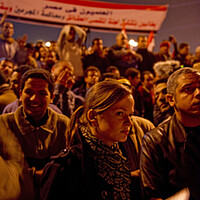Al Jazeera in crosshairs as Egypt silences dissenting voices
Loading...
| Cairo
As Egypt’s rulers have moved to silence dissent since last July’s coup, international news media have felt a chill, and none more so than Al Jazeera, the Qatari network credited with helping to spread the Arab Spring. Now the network is paying the price: of the seven journalists currently detained in Egypt, five are employees of Al Jazeera. (Editor's note: This sentence has been edited to correctly reflect the number of journalists detained.)
The network's Arabic channel and its local affiliate were known for their favorable coverage to President Mohamed Morsi, a former leader of the Muslim Brotherhood, who was ousted in the popularly supported coup in July. Since then, in contrast to most Egyptian media, Al Jazeera has led with critical coverage of the military’s violent suppression of the Brotherhood and non-Islamist political activists.
That crackdown has extended to journalists, with dozens assaulted or detained for short periods since the coup. But it has disproportionately focused on Al Jazeera, underscoring the government’s animus toward a network that won’t play its tune.
Shadi Hamid, a fellow at the Saban Center for Middle East Policy at the Brookings Institution, says elements of Egypt’s security establishment have long looked askance at Al Jazeera. “But what is new is that this new government wants to totally control the flow of information and wants to limit Egyptians' exposure to alternative viewpoints, and there's no Egyptian channel that provides an alternative viewpoint,” he says.
For now, Al Jazeera and other regional channels are still providing critical coverage of Egypt. But the Qatari network's reporters are now unable to work in Egypt and it must rely on news agencies, says Bernard Smith, a Doha-based correspondent for Al Jazeera English, which is editorially separate from the Arabic channel.
Emad Shahin, a professor at the American University in Cairo, says the arrests are meant to silence Al Jazeera and its reporters and “is a continuation of the message of suppressing any opposition, any voice that opposes this coup," he says.
Mohamed Badr, a cameraman for Al Jazeera Egypt Live, the local affiliate, was the first one arrested, in July. The following month it was the turn of Abdullah Al Shami, a correspondent for the Arabic channel who was arrested while covering the security forces' attack on a pro-Morsi protest camp. The Egyptian affiliate has since been forced to close down its local offices.
Authorities have also targeted Al Jazeera English. Three of its employees – senior producer Mohamed Fahmy, producer Baher Mohamed, and international correspondent Peter Greste – were detained Dec. 29. Egypt's prosecutor has accused the journalists of broadcasting false news to tarnish Egypt's image and disrupt national security, working without proper accreditation, and using unlicensed equipment.
The prosecutor said in a statement last week that some of the three had confessed to being members of the Muslim Brotherhood, which was recently branded as a terrorist organization. Al Jazeera strongly denies this and other accusations, saying the reporters were simply doing their jobs.
International media organizations appealed last week to Egyptian authorities to end the "arbitrary imprisonment" of the detained journalists. The Monitor was among the organizations that signed the appeal.
Mr. Smith, who has reported from Cairo and worked with Mr. Fahmy and Mr. Mohamed, denies any favoritism. “We bend over backwards to make sure our coverage of Egypt was balanced. So to suggest that it was supportive of the Muslim Brotherhood is just not true,” he says.
All three are held in solitary confinement. But Fahmy, an Egyptian-Canadian, and Mohamed, an Egyptian, are facing harsher conditions than Mr. Greste, an Australian citizen. The two are detained in a maximum-security facility in dark cells plagued by cockroaches and mosquitoes. Fahmy's brother, Adel Fahmy, says he has been denied access to reading material, and initially was not allowed any blankets.
Fahmy, who previously worked for CNN and The New York Times, has been denied medical care for a shoulder fracture suffered before he was arrested and is “considerable pain,” says his brother. “It hurts to see him like this,” says Adel. “He looks worried. He looks tense. His face is very pale because of not getting any sunlight for a long period.”
Family members were initially hopeful that the journalists would be released quickly, but today Egypt's prosecutor extended Greste's detention for 15 days, and Adel says Fahmy is now convinced that authorities plan to take his case to court.
“I believe he's a scapegoat, an opportunity that authorities found to earn some points versus Qatar, possibly, to get rid of networks like Al Jazeera that are causing them headaches,” he says.








